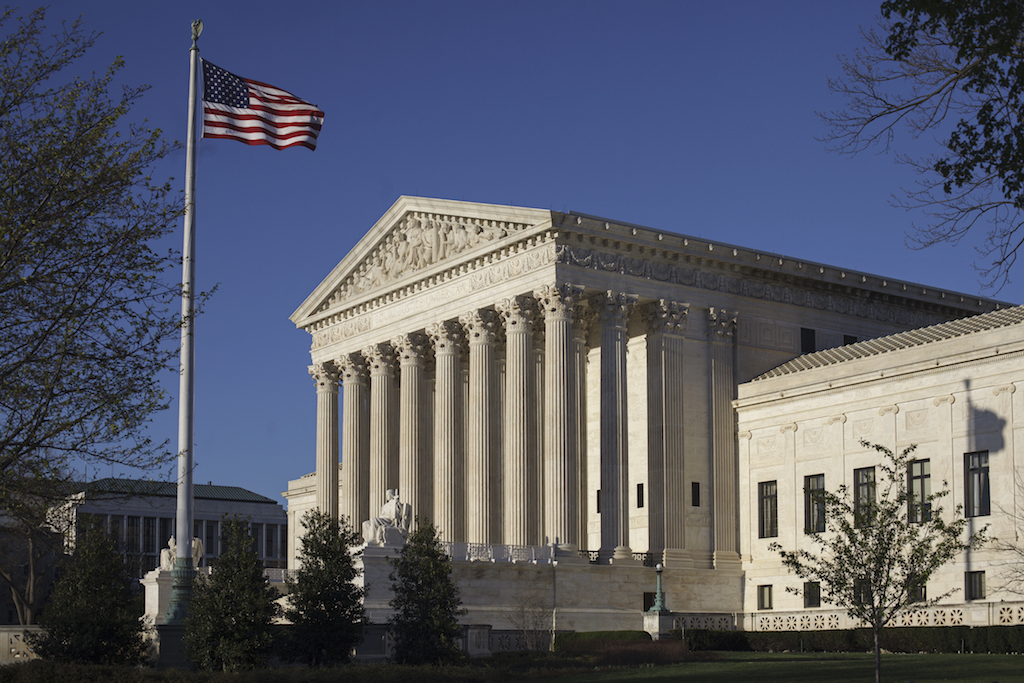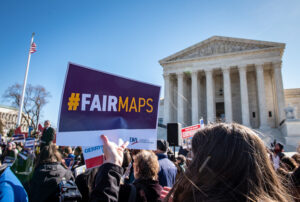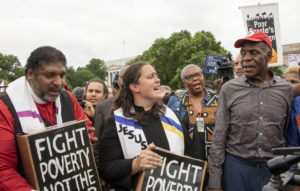High Court Leaves Some Voting Rights Issues Unresolved
This week's developments mean the U.S. Supreme Court will make no major decision on voting rights before the midterm elections. The U.S. Supreme Court. (J. Scott Applewhite / AP)
The U.S. Supreme Court. (J. Scott Applewhite / AP)
On Monday, the U.S. Supreme Court once again passed on the opportunity to make sweeping decisions on redistricting and voting rights cases. It rejected a challenge to current Texas congressional maps (Abbott v. Perez), which plaintiffs say discriminate against black and Latino voters, and it declined to rule on a North Carolina gerrymandering case, Rucho v. Common Cause, sending the issue back to a trial court in that state to determine whether the plaintiffs have standing.
“A narrow Supreme Court majority under Chief Justice John Roberts has failed to protect the voting rights of minority communities,” Karen Hobart, president of the watchdog group Common Cause, said of the latter case.
The developments came on the heels of similar moves by the high court in gerrymandering cases in Maryland and Wisconsin. As The Washington Post reported, the court in the earlier cases didn’t rule on the merits of the issue—whether the electoral maps in those two states were so partisan that they effectively disenfranchised voters from, in Maryland, the Republican Party and, in Wisconsin, the Democratic Party. “Instead, the Post writes, “the high court ruled on narrow, technical grounds that steered clear of the central issue, with the plaintiffs hoping to get the justices to rule on when and whether legislative districts become so skewed to favor one party that they violate voters’ constitutional rights.”
In North Carolina, the GOP-controlled state Legislature drew electoral maps in an attempt to protect Republican power in a battleground state that has a Democrat governor and attorney general. Ten of the state’s 13 congressional districts are led by Republicans.
North Carolina Republicans had done nothing to hide their intentions. As the Post writes, Rep. David Lewis, a Republican member of the General Assembly, said, “I think electing Republicans is better than electing Democrats. So I drew this map to help foster what I think is better for the country.”
Now the trial court will have to decide whether the plaintiffs have the legal standing to challenge Lewis’ plan.
Politico calls the Texas litigation “a more traditional redistricting case” in that it deals with racial rather than partisan discrimination.
The justices were split 5-4 along party lines over whether Texas’ electoral maps for both the state Senate and the state House violated the 1964 Voting Rights Act by discriminating against black and Latino voters.
In a majority opinion written by Justice Samuel Alito, the conservative justices decided, as Politico reported, that “lower courts went too far in concluding that maps adopted by Texas in 2013 were tainted by discrimination judges found in maps the state drew two years earlier.”
“When all the relevant evidence in the record is taken into account,” Alito wrote, “it is plainly insufficient to prove that the 2013 Legislature acted in bad faith and engaged in intentional discrimination.” He continued, “It was reasonable for the Legislature to think that approving the court-approved plans might at least reduce objections and thus simplify and expedite the conclusion of the litigation.”
Justice Sonia Sotomayor did not believe the Texas Legislature had acted in good faith, writing that just because the interim maps drawn in 2012 addressed some discrimination issues, it didn’t mean that all of them had been solved. Nor did it mean, as Sotomayor wrote in her dissent, that the Legislature was “free to wholly disregard the significance of other evidence of discrimination that tainted its 2011 maps and were entrenched in the 2012 interim maps.”
In this session of the Supreme Court, now drawing to a close, the justices have decided to avoid a major decision on voting rights rather than send a clear message going into the 2018 midterm elections.
Your support matters…Independent journalism is under threat and overshadowed by heavily funded mainstream media.
You can help level the playing field. Become a member.
Your tax-deductible contribution keeps us digging beneath the headlines to give you thought-provoking, investigative reporting and analysis that unearths what's really happening- without compromise.
Give today to support our courageous, independent journalists.






You need to be a supporter to comment.
There are currently no responses to this article.
Be the first to respond.